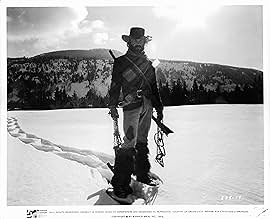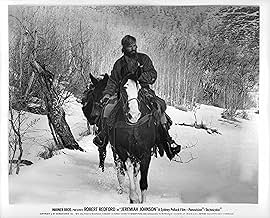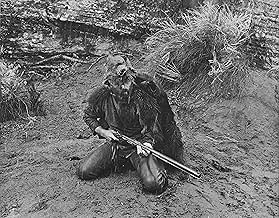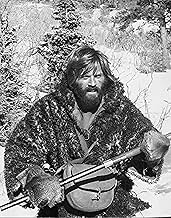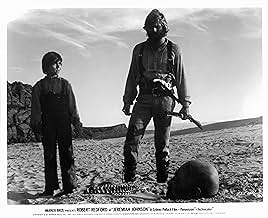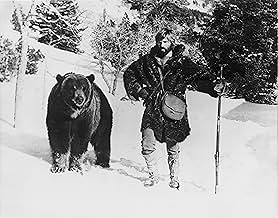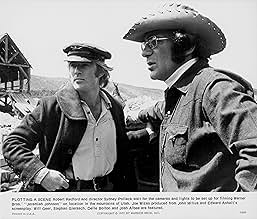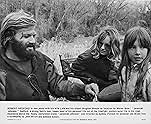Jeremiah Johnson
- 1972
- Tous publics
- 1h 48min
Un montagnard qui souhaite mener une vie d'ermite devient malgré lui l'objet d'une longue vendetta de la part des Indiens.Un montagnard qui souhaite mener une vie d'ermite devient malgré lui l'objet d'une longue vendetta de la part des Indiens.Un montagnard qui souhaite mener une vie d'ermite devient malgré lui l'objet d'une longue vendetta de la part des Indiens.
- Réalisation
- Scénario
- Casting principal
- Récompenses
- 1 victoire et 1 nomination au total
- Paints His Shirt Red
- (as Joaquin Martinez)
- Indian
- (non crédité)
- Qualen's Daughter
- (non crédité)
Avis à la une
When you know how to sympathize with people in their sorrows, yea, even in their sins - knowing that each person fights a hard fight against many odds. When you have learned how to make friends and to keep them, and above all how to keep friends with yourself. When you love flowers, can hunt the birds without a gun, and feel the thrill of an old forgotten joy, when you hear the laugh of a little child.
When you can be happy and high-minded amid the meaner drudgeries of life. When star-crowned trees, and the glint of sunlight on flowing waters, subdue you like the thought of one much loved and long dead; when no voice of distress reaches your ears in vain, and no hand seeks your aid without response.
When you find good in every faith that helps any man to lay hold of divine things and sees majestic meanings in life, whatever the name of that faith may be. When you look into a wayside puddle and see something beyond mud, and into the face of the most forlorn mortal and see something beyond sin.
When you know how to pray, how to love, how hope. When you have kept faith with yourself, with your fellow man, with your God; in your hand a sword for evil, in your heart a bit of a song - glad to live, but not afraid to die! Such a person has found the only real secret of life, and the one filmmakers continue to try to give to all the world.
Thank you kindly. I remember from allegories, conferrals, and degrees of work among actors, crews, and more importantly, writers!
Summary: What you do for yourself alone will die with you, what you do for others and the world will remain and be immortal. When warranted because of quality of story and significance of filmmakers and actors, I recall memories of beautiful stories portrayed on stage with trusted people to my side helping everyone equally as best they could. Jeremiah Johnson is a stand out film in my opinion only expressed here hopefully among trusted film lovers. Needed now more than ever before. 1 / 6 / 2021. *I am still alive after Covid-ruptured gallbladder 08-18-2022. SMIB.
Thirty years on and after several viewings, I find this story grows on you, like the aging of fine wine in oak casks, such that another recent viewing gave me as much if not more pleasure. Precisely because it is not the standard `western' formula. One gets a little tired of John Wayne getting saddle-sore, killing indians and wooing women; at times watching `Jeremiah Johnson' I cannot help comparing a little with `Dances with Wolves' (qv), not because of any story similarity but more from certain situations being played out.
Robert Redford has given us numerous films in which his characterization is pretty good in general, but in this film I rather fancy he was inspired, even to the point of throwing off that silly category so beloved of those suffering Hollywooditis. Most notable in `The Sting' (qv), `All the President's Men', `Out of Africa', and `A River Runs Through it', without forgetting his excellent directing of `Ordinary People', one of the best true-life dramas I have seen.
`Jeremiah Johnson' is now one of the classics of the genre and even of cinema as a whole: always worth another viewing.
As Jeremiah Johnson (Robert Redford) wanders the mountains like a fugitive stricken by disaster, a solitary figure against awe-inspiring backdrops of massive rock formations, steep ravines and expansive mesas, you can tangibly feel the film, like the hero, transcending the specific time and place and breaching out vision to become an all-encompassing spiritual journey where the individual characters - fur trappers, bear hunters or Indians - are merely the unwitting parners in a dance of death.
Some viewers may be put off by the lack of straight-forward plot, the episodic, repetitive nature of the movie or the long stretches of silence, but it's from those exact things the movie takes its power. JJ comes unto its own in those small moments of quietude, in Johnson's silent encounters with indians, in the barren, unforgiving wastes of the craggy mountains that reflect so well the psychology of characters wandering in their shadow, in the subtle, heartwarming interactions Johnson has with the Indian woman he's taken for a wife and the mute boy he's taken for a son. There's hardly a word uttered between this peculiar family the entire movie but the ways they learn to overcome the barriers that separate them is a touching sight to behold.
There is some dated montage, a corny soundtrack; how much of this will affect your enjoyment will boil down to your affinity with how cinema was in the 70's. Still, what is left is this beautiful parable of broken humans learning to be whole again. Equal parts visceral, savage and heartwarming.
Unfortunately, he is bamboozled into a most peculiar family situation involving a mute son of a crazy pioneer woman and the daughter of a French-speaking Native American chief. In the end, what director Sydney Pollack is all about is showcasing how nature can indeed salve some of our pain and make us feel more comfortable with our situations. Nevertheless, true relationships with people cannot be substituted. Beautiful photography, strong performances and a most intriguing storyline all help create a very interesting film that is worth multiple views and considerable think time.
Le saviez-vous
- AnecdotesBased upon a real-life trapper named John Johnston, nicknamed "Crow Killer" and "Liver Eater Johnston" for his penchant for cutting out and eating the livers of Crow Indians he had killed (several Crows had murdered his wife and he swore vengeance against the entire tribe).
- GaffesAfter burying her murdered family, Crazy Woman begins singing "Shall We Gather at the River" and Jeremiah joins in. This song was written by Robert Lowry in 1864 and first published in 1865, long after the time of the mountain men.
- Citations
Del Gue: I ain't never seen 'em, but my common sense tells me the Andes is foothills, and the Alps is for children to climb! Keep good care of your hair! These here is God's finest scupturings! And there ain't no laws for the brave ones! And there ain't no asylums for the crazy ones! And there ain't no churches, except for this right here! And there ain't no priests excepting the birds. By God, I are a mountain man, and I'll live 'til an arrow or a bullet finds me. And then I'll leave my bones on this great map of the magnificent...
- Versions alternativesThe Warner Bros. Pictures logo is plastered with the Saul Bass variant in the 1982 VHS, 1992 variant in the DVD and 1998 VHS. The former print also has the closing Saul Bass variant plastering the line art WB shield.
- ConnexionsEdited into La Classe américaine : Le Grand Détournement (1993)
Meilleurs choix
Détails
Box-office
- Budget
- 3 100 000 $US (estimé)
- Durée
- 1h 48min(108 min)
- Couleur
- Rapport de forme
- 2.35 : 1



